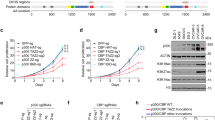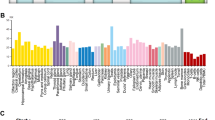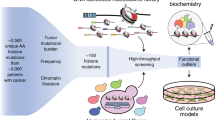Abstract
The EP300 protein is a histone acetyltransferase1,2 that regulates transcription via chromatin remodelling3 and is important in the processes of cell proliferation4 and differentiation5. EP300 acetylation of TP53 in response to DNA damage regulates its DNA-binding and transcription functions6,7,8,9. A role for EP300 in cancer has been implied by the fact that it is targeted by viral oncoproteins, it is fused to MLL in leukaemia and two missense sequence alterations in EP300 were identified in epithelial malignancies10,11,12,13. Nevertheless, direct demonstration of the role of EP300 in tumorigenesis by inactivating mutations in human cancers has been lacking. Here we describe EP300 mutations, which predict a truncated protein, in 6 (3%) of 193 epithelial cancers analysed. Of these six mutations, two were in primary tumours (a colorectal cancer and a breast cancer) and four were in cancer cell lines (colorectal, breast and pancreatic). In addition, we identified a somatic in-frame insertion in a primary breast cancer and missense alterations in a primary colorectal cancer and two cell lines (breast and pancreatic). Inactivation of the second allele was demonstrated in five of six cases with truncating mutations and in two other cases. Our data show that EP300 is mutated in epithelial cancers and provide the first evidence that it behaves as a classical tumour-suppressor gene.
This is a preview of subscription content, access via your institution
Access options
Subscribe to this journal
Receive 12 print issues and online access
$209.00 per year
only $17.42 per issue
Buy this article
- Purchase on Springer Link
- Instant access to full article PDF
Prices may be subject to local taxes which are calculated during checkout


Similar content being viewed by others
References
Bannister, A.J. & Kouzarides, T. The CBP co-activator is a histone acetyltransferase. Nature 384, 641–643 (1996).
Ogryzko, V.V., Schiltz, R.L., Russanova, V., Howard, B.H. & Nakatani, Y. The transcriptional coactivators p300 and CBP are histone acetyltransferases. Cell 87 , 953–959 (1996).
Grunstein, M. Histone acetylation in chromatin structure and transcription. Nature 389, 349–352 ( 1997).
Yao, T.P. et al. Gene dosage-dependent embryonic development and proliferation defects in mice lacking the transcriptional integrator p300. Cell 93, 361–372 ( 1998).
Kawasaki, H. et al. Distinct roles of the co-activators p300 and CBP in retinoic-acid-induced F9-cell differentiation. Nature 393, 284 –289 (1998).
Avantaggiati, M.L. et al. Recruitment of p300/CBP in p53-dependent signal pathways. Cell 89, 1175–1184 ( 1997).
Gu, W. & Roeder, R.G. Activation of p53 sequence-specific DNA binding by acetylation of the p53 C-terminal domain. Cell 90, 595–606 (1997).
Lill, N.L., Grossman, S.R., Ginsberg, D., DeCaprio, J. & Livingston, D.M. Binding and modulation of p53 by p300/CBP coactivators. Nature 387, 823 –827 (1997).
Sakaguchi, K. et al. DNA damage activates p53 through a phosphorylation-acetylation cascade. Genes Dev. 12, 2831– 2841 (1998).
Arany, Z., Newsome, D., Oldread, E., Livingston, D.M. & Eckner, R. A family of transcriptional adaptor proteins targeted by the E1A oncoprotein. Nature 374, 81– 84 (1995).
Lundblad, J.R., Kwok, R.P., Laurance, M.E., Harter, M.L. & Goodman, R.H. Adenoviral E1A-associated protein p300 as a functional homologue of the transcriptional co-activator CBP. Nature 374, 85–88 ( 1995).
Ida, K. et al. Adenoviral E1A-associated protein p300 is involved in acute myeloid leukemia with t(11;22)(q23;q13). Blood 90, 4699–4704 (1997).
Muraoka, M. et al. p300 gene alterations in colorectal and gastric carcinomas . Oncogene 12, 1565–1569 (1996).
Arany, Z., Sellers, W.R., Livingston, D.M. & Eckner, R. E1A-associated p300 and CREB-associated CBP belong to a conserved family of coactivators. Cell 77, 799– 800 (1994).
Oike, Y. et al. Truncated CBP protein leads to classical Rubinstein-Taybi syndrome phenotypes in mice: implications for a dominant-negative mechanism. Hum. Mol. Genet. 8, 387–396 (1999).
Foster, K.A. et al. Somatic and germline mutations of the BRCA2 gene in sporadic ovarian cancer. Cancer Res. 56, 3622– 3625 (1996).
Gayther, S.A. et al. Aberrant splicing of the TSG101 and FHIT genes occurs frequently in multiple malignancies and in normal tissues and mimics alterations previously described in tumours. Oncogene 15, 2119–2126 (1997).
Caldas, C. et al. Frequent somatic mutations and homozygous deletions of the p16 (MTS1) gene in pancreatic adenocarcinoma. Nature Genet. 8, 27–32 (1994); erratum: 8, 410 (1994).
Acknowledgements
We thank I. Scott, R. Sud, I. Talbot and V. Basham for help with collecting tumour material and technical assistance, and the three anonymous reviewers for their thoughtful criticism of the manuscript. This research was supported by The Cancer Research Campaign (CRC).
Author information
Authors and Affiliations
Corresponding author
Supplementary information
Rights and permissions
About this article
Cite this article
Gayther, S., Batley, S., Linger, L. et al. Mutations truncating the EP300 acetylase in human cancers. Nat Genet 24, 300–303 (2000). https://doi.org/10.1038/73536
Received:
Accepted:
Issue Date:
DOI: https://doi.org/10.1038/73536
This article is cited by
-
Lactate score classification of hepatocellular carcinoma helps identify patients with tumors that respond to immune checkpoint blockade therapy
Cellular Oncology (2024)
-
Regulation of antitumor immunity by inflammation-induced epigenetic alterations
Cellular & Molecular Immunology (2022)
-
Interplay between p300 and HDAC1 regulate acetylation and stability of Api5 to regulate cell proliferation
Scientific Reports (2021)
-
Identification of de novo EP300 and PLAU variants in a patient with Rubinstein–Taybi syndrome-related arterial vasculopathy and skeletal anomaly
Scientific Reports (2021)
-
EP300 knockdown reduces cancer stem cell phenotype, tumor growth and metastasis in triple negative breast cancer
BMC Cancer (2020)



